亚伯拉罕·林肯(Abraham Lincoln) 就职演说翻译
#096 - 译文Abraham Lincoln, Part 1
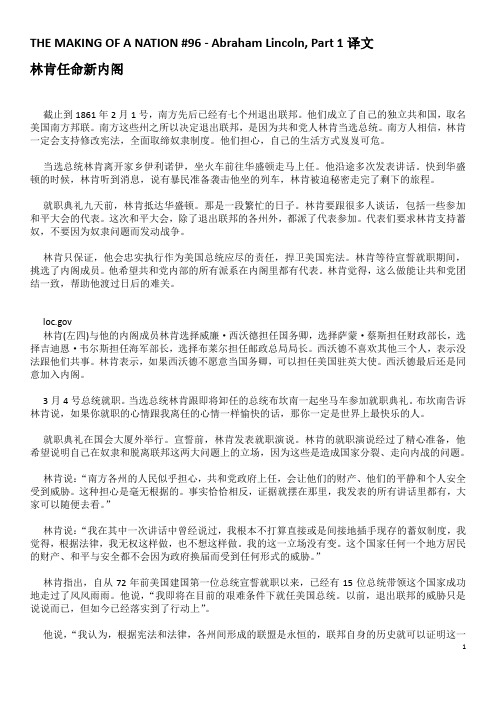
THE MAKING OF A NATION #96 - Abraham Lincoln, Part 1译文林肯任命新内阁截止到1861年2月1号,南方先后已经有七个州退出联邦。
他们成立了自己的独立共和国,取名美国南方邦联。
南方这些州之所以决定退出联邦,是因为共和党人林肯当选总统。
南方人相信,林肯一定会支持修改宪法,全面取缔奴隶制度。
他们担心,自己的生活方式岌岌可危。
当选总统林肯离开家乡伊利诺伊,坐火车前往华盛顿走马上任。
他沿途多次发表讲话。
快到华盛顿的时候,林肯听到消息,说有暴民准备袭击他坐的列车,林肯被迫秘密走完了剩下的旅程。
就职典礼九天前,林肯抵达华盛顿。
那是一段繁忙的日子。
林肯要跟很多人谈话,包括一些参加和平大会的代表。
这次和平大会,除了退出联邦的各州外,都派了代表参加。
代表们要求林肯支持蓄奴,不要因为奴隶问题而发动战争。
林肯只保证,他会忠实执行作为美国总统应尽的责任,捍卫美国宪法。
林肯等待宣誓就职期间,挑选了内阁成员。
他希望共和党内部的所有派系在内阁里都有代表。
林肯觉得,这么做能让共和党团结一致,帮助他渡过日后的难关。
林肯(左四)与他的内阁成员林肯选择威廉·西沃德担任国务卿,选择萨蒙·蔡斯担任财政部长,选择吉迪恩·韦尔斯担任海军部长,选择布莱尔担任邮政总局局长。
西沃德不喜欢其他三个人,表示没法跟他们共事。
林肯表示,如果西沃德不愿意当国务卿,可以担任美国驻英大使。
西沃德最后还是同意加入内阁。
3月4号总统就职。
当选总统林肯跟即将卸任的总统布坎南一起坐马车参加就职典礼。
布坎南告诉林肯说,如果你就职的心情跟我离任的心情一样愉快的话,那你一定是世界上最快乐的人。
就职典礼在国会大厦外举行。
宣誓前,林肯发表就职演说。
林肯的就职演说经过了精心准备,他希望说明自己在奴隶和脱离联邦这两大问题上的立场,因为这些是造成国家分裂、走向内战的问题。
林肯说:“南方各州的人民似乎担心,共和党政府上任,会让他们的财产、他们的平静和个人安全受到威胁。
林肯第二次就职演说
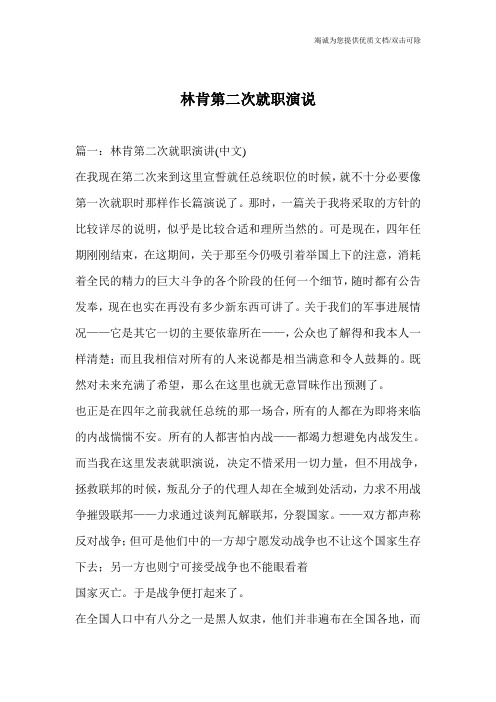
林肯第二次就职演说篇一:林肯第二次就职演讲(中文)在我现在第二次来到这里宣誓就任总统职位的时候,就不十分必要像第一次就职时那样作长篇演说了。
那时,一篇关于我将采取的方针的比较详尽的说明,似乎是比较合适和理所当然的。
可是现在,四年任期刚刚结束,在这期间,关于那至今仍吸引着举国上下的注意,消耗着全民的精力的巨大斗争的各个阶段的任何一个细节,随时都有公告发奉,现在也实在再没有多少新东西可讲了。
关于我们的军事进展情况——它是其它一切的主要依靠所在——,公众也了解得和我本人一样清楚;而且我相信对所有的人来说都是相当满意和令人鼓舞的。
既然对未来充满了希望,那么在这里也就无意冒昧作出预测了。
也正是在四年之前我就任总统的那一场合,所有的人都在为即将来临的内战惴惴不安。
所有的人都害怕内战——都竭力想避免内战发生。
而当我在这里发表就职演说,决定不惜采用一切力量,但不用战争,拯救联邦的时候,叛乱分子的代理人却在全城到处活动,力求不用战争摧毁联邦——力求通过谈判瓦解联邦,分裂国家。
——双方都声称反对战争;但可是他们中的一方却宁愿发动战争也不让这个国家生存下去;另一方也则宁可接受战争也不能眼看着国家灭亡。
于是战争便打起来了。
在全国人口中有八分之一是黑人奴隶,他们并非遍布在全国各地,而是大部分集中在我国南方。
这些黑人构成一个特殊强有力的权益。
大家都知道这权益是导致战争的原因。
为了达到加强、永久化保持和扩大这个权益的目的,叛乱分子甚至不惜通过战争瓦解联邦;而政府方面,只不过是要求有权限制奴隶制扩大其地域。
双方谁也没有料想到,战争竟会达到现在已出现了这种规模,或持续这么久。
双方谁也不曾料到,冲突的缘由可能会随着冲突的结束而结束,或甚至在冲突本身结束之前,便已终止;每一方都寻求能比较轻易地获得胜利,战争的结果也不那么带有根本性和惊人。
双方都读着同一部《圣经》,祈祷于同一个上帝;每一方都求上帝帮助他们一方,而反对另一方。
这看来也许有些不可思议,怎么可能有人公然敢于祈求公正的上帝帮助他从别人的血汗中榨取面包;不过,我们且不要论断别人,以免自己遭到论断吧。
林肯3分钟演讲稿中英文版
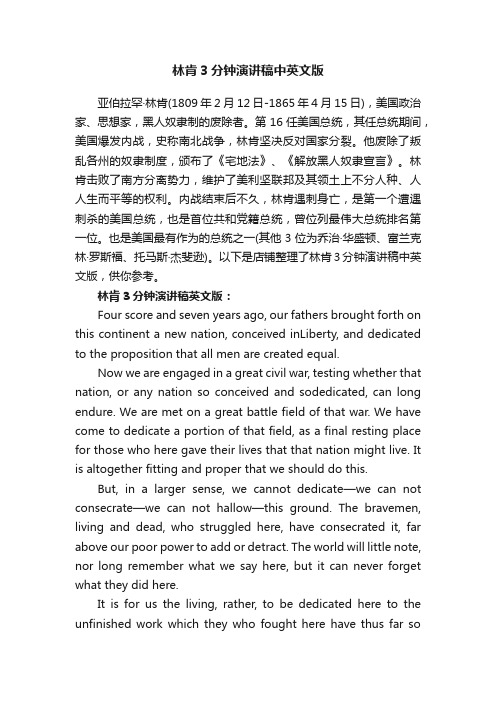
林肯3分钟演讲稿中英文版亚伯拉罕·林肯(1809年2月12日-1865年4月15日),美国政治家、思想家,黑人奴隶制的废除者。
第16任美国总统,其任总统期间,美国爆发内战,史称南北战争,林肯坚决反对国家分裂。
他废除了叛乱各州的奴隶制度,颁布了《宅地法》、《解放黑人奴隶宣言》。
林肯击败了南方分离势力,维护了美利坚联邦及其领土上不分人种、人人生而平等的权利。
内战结束后不久,林肯遇刺身亡,是第一个遭遇刺杀的美国总统,也是首位共和党籍总统,曾位列最伟大总统排名第一位。
也是美国最有作为的总统之一(其他3位为乔治·华盛顿、富兰克林·罗斯福、托马斯·杰斐逊)。
以下是店铺整理了林肯3分钟演讲稿中英文版,供你参考。
林肯3分钟演讲稿英文版:Four score and seven years ago, our fathers brought forth on this continent a new nation, conceived inLiberty, and dedicated to the proposition that all men are created equal.Now we are engaged in a great civil war, testing whether that nation, or any nation so conceived and sodedicated, can long endure. We are met on a great battle field of that war. We have come to dedicate a portion of that field, as a final resting place for those who here gave their lives that that nation might live. It is altogether fitting and proper that we should do this.But, in a larger sense, we cannot dedicate—we can not consecrate—we can not hallow—this ground. The bravemen, living and dead, who struggled here, have consecrated it, far above our poor power to add or detract. The world will little note, nor long remember what we say here, but it can never forget what they did here.It is for us the living, rather, to be dedicated here to the unfinished work which they who fought here have thus far sonobly advanced. It is rather for us to be here dedicated to the great task remaining before us — that from these honored dead we take increased devotion to that cause for which they gave the last full measure of devotion — that we here highly resolve that these dead shall not have died in vain — that this nation, under God, shall have a new birth of freedom — and that government of the people, by the people, for the people, shall not perish from the earth.林肯3分钟演讲稿中文版:八十七年前吾辈先祖于这大陆上,创建一个新的国度,乃孕育于自由,且致力于凡人“皆生而平等”此信念。
林肯就职演讲稿全文

林肯就职演讲稿全文1860年11月,林肯当选总统,共和党首次执政。
林肯的当选对南方种植园主的利益构成严重威胁,南方种植园奴隶主为制造分裂,发动了叛变,南方11个州先后退出联邦,宣布成立“美利坚联盟国”,并制订了新的宪法,选举新总统。
以下是店铺整理了林肯就职演讲稿全文,供你参考。
林肯就职演讲稿全文如下:At this second appearing to take the oath of the presidential office, there is less occasion for an extended address than there was at the first. Then a statement,somewhat in detail,of a course to be pursued,seemed fitting and proper. Now,at the expiration of four years,during which public declarations have been constantly called forth on every point and phase of the great contest which still absorbs the attention, and engrosses the energies of the nation,little that is new could be presented. The progress of our arms,upon which all else chiefly depends,is as well known to the public as to myself;and it is,I trust,reasonably satisfactory and encouraging to all. With high hope for the future,no prediction in regard to it is ventured. On the occasion corresponding to this four years ago,all thoughts were anxiously directed to an impending civil war. All dreaded it--all sought to avert it. While the inaugural address was being delivered from this place,devoted altogether to saving the Union without war,insurgent agents were in the city seeking to destroy it without war--seeking to dissolve the Union,and divide effects,by negotiation. Both parties deprecated war;but one of them would make war rather than let the nation survive;and the other would accept war rather than let it perish. And the war came. One eighth of the whole population were colored slaves,not distributed generally over the Union,but localized in the Southern part of it. These slaves constituted a peculiar and powerful interest. All knew that this interest was,somehow,the cause of the war. To strengthen, perpetuate,and extend this interest was the object for which the insurgents would rend the Union,even by war;while the government claimed no right to do more than to restrict the territorial enlargement of it. Neither party expected for the war,the magnitude,or the duration,which it has already attained. Neither anticipated that the cause of the conflict might cease with,or even before,the conflict itself should cease. Each looked for an easier triumph,and a result less fundamental and astounding. Both read the same Bible,and astounding to the same God;and each invokes His aid against the other. It may seem strange that any men should dare to ask a just God's assistance in wringing their bread from the sweat of other men's faces;but let us judge not that we be not judged. The prayers of both could not be answered;that of neither has been answered fully. The Almighty has his own purposes. "Woe unto the world because of offence! for it must needs be that offence s come;but woe to that man by whom the offence cometh!"If we shall suppose that American Slavery is one of those offences which,in the providence of God,must needs come,but which,having continued through His appointed time,He now wills to remove, and that He gives to both North and South,this terrible war,as the woe due to those by whom the offencecame,shall we discern therein any departure from those divine attributes which the believers in a Living God always ascribe to Him? Fondly do we hope--fervently do we pray--that this mighty scourge of war may speedily pass away. Yet, if God wills that it continue,until all the wealth piled by the bond-man's two hundred and fifty years of unrequited toil shall be sunk,and until every drop of blood drawn with the lash,shall be paid by another drawn with the sword,as was said three thousand years ago,so still it must be said "the judgments of the Lord,are true and righteous altogether"With malice toward none;with charity for all;with firmness in the right,as God gives us to see the right,let us strive on to finish the work we are in;to bind up the nation's wounds;to care for him who shall have borne the battle,and for his widow,and his orphan--to do all which may achieve and cherish a just and lasting peace,among ourselves,and with all nations.林肯人物评价:亚伯拉罕·林肯(Abraham Lincoln)(1809年02月12日—1865年04月15日),是美国第16任总统,首位共和党籍总统,也是首位被暗杀的美国总统。
林肯就职演讲英文

林肯总统在1861年的第一次就职演说--英文版there has never been any reasonable cause for such apprehension. indeed, the mostample evidence to the contrary has all the while existed and been open to theirinspection. it is found in nearly all the published speeches of him who now addressesyou. i do but quote from one of those speeches when i declare that-- i have no purpose,directly or indirectly, to interfere with the institution of slavery in the stateswhere it exists. i believe i have no lawful right to do so, and i have no inclinationto do so. those who nominated and elected me did so with full knowledge that i hadmade this and many similar declarations and had never recanted them; and more thanthis, they placed in the platform for my acceptance, and as a law to themselves andto me, the clear and emphatic resolution which i now read: resolved, that themaintenance inviolate of the rights of the states, and especially the right of eachstate to order and control its own domestic institutions according to its own judgmentexclusively, is essential to that balance of power on which the perfection andendurance of our political fabric depend; and we denounce the lawless invasion byarmed force of the soil of any state or territory, no matter what pretext, as amongthe gravest of crimes.unanimity frame and pass a law by means of which to keep good that unanimous oath?there is some difference of opinion whether this clause should be enforced by nationalor by state authority, but surely that difference is not a very material one. if theslave is to be surrendered, it can be of but little consequence to him or to othersby which authority it is done. and should anyone in any case be content that his oathshall go unkept on a merely unsubstantial controversy as to how it shall be kept? again: in any law upon this subject ought not all the safeguards of liberty knownin civilized and humane jurisprudence to be introduced, so that a free man be notin any case surrendered as a slave? and might it not be well at the same time to provideby law for the enforcement of that clause in the constitution which guarantees that the citizens of each state shall be entitled to all privilegesand immunities of citizens in the several states? i take the official oath to-daywith no mental reservations and with no purpose to construe the constitution or lawsby any hypercritical rules; and while i do not choose now to specify particular actsof congress as proper to be enforced, i do suggest that it will be much safer forall, both in official and private stations, to conform to and abide by all those actswhich stand unrepealed than to violate any of them trusting to find impunity in havingthem held to be unconstitutional. it is seventy-two years since the first inaugurationof a president under our national constitution. during that period fifteen differentand greatly distinguished citizens have in succession administered the executive branch of the government. they have conducted itthrough many perils, and generally with great success. yet, with all this scope of precedent, i now enter upon the same task for thebrief constitutional term of four years under great and peculiar difficulty. adisruption of the federal union, heretofore only menaced, is now formidably attempted. i hold that in contemplation of universal law and of the constitutionthe union of these states is perpetual. perpetuity is implied, if not expressed, inthe fundamental law of all national governments. it is safe to assert that nogovernment proper ever had a provision in its organic law for its own termination.continue to execute all the express provisions of our national constitution, and theunion will endure forever, it being impossible to destroy it except by some actionnot provided for in the instrument itself. again: if the united states be not agovernment proper, but an association of states in the nature of contract merely,can it, as acontract, be peaceably unmade by less than all the parties who made it?one party to a contract may violate it--break it, so to speak--but does it not requireall to lawfully rescind it? descending from these general principles, we find theproposition that in legal contemplation the union is perpetual confirmed by thehistory of the union itself. the union is much older than the constitution. it was formed, in fact, by the articles of association in 1774. it was maturedand continued by the declaration of independence in 1776. it was further matured,and the faith of all the then thirteen states expressly plighted and engaged thatit should be perpetual, by the articles of confederation in 1778. and finally, in1787, one of the declared objects for ordaining and establishing the constitutionwas to form a more perfect union. but if destruction of the union by one or by a partonly of the states be lawfully possible, the union is less perfect than before theconstitution, having lost the vital element of perpetuity. it follows from these viewsthat no state upon its own mere motion can lawfully get out of the union; that resolvesand ordinances to that 林肯的第二任总统就职演说这篇演说的讲稿是人类历史上最伟大的演说词,永久地刻在了林肯纪念堂里,英文原文是:at this second appearing to take the oath of the presidential office,there isless occasion for an extended address than there was at the first. then a statement,somewhat in detail,of a course to be pursued,seemed fitting and proper. now,atthe expiration of four years,during which public declarations have been constantlycalled forth on every point and phase of the great contest which still absorbs theattention,and engrosses the energies of the nation,little that is new could bepresented. the progress of our arms,upon which all else chiefly depends,is as wellknown to the public as to myself; and it is,i trust,reasonably satisfactory andencouraging to all. with high hope for the future,no prediction in regard to it isventured. on the occasion corresponding to this four years ago,all thoughts were anxiouslydirected to an impending civil war. all dreaded it--all sought to avert it. whilethe inaugural address was being delivered from this place,devoted altogether tosaving the union without war,insurgent agents were in the city seeking to destroyit without war--seeking to dissolve the union,and divide effects,by negotiation.both parties deprecated war; but one of them would make war rather than let the nationsurvive; and the other would accept war rather than let it perish. and the war came. one eighth of the whole population were colored slaves,not distributed generally over the union,but localized in the southern part of it.these slaves constituted a peculiar and powerful interest. all knew that this interestwas,somehow,the cause of the war. to strengthen,perpetuate,and extend this interestwas the object for which theinsurgents would rend the union,even by war; while the government claimed noright to do more than to restrict the territorial enlargement of it. neither partyexpected for the war,the magnitude,or the duration,which it has already attained.neither anticipated that the cause of the conflict might cease with,or even before,the conflict itself should cease. each looked for an easier triumph,and a result less fundamental and astounding.both read the same bible,and astounding to the same god; and each invokes his aidagainst the other. it may seem strange that any men should dare to ask a just godsassistance in wringing their bread from with malice toward none; with charity for all; with firmness in the right,asgod gives us to see the right,let us strive on to finish the work we are in; to bindup the nations wounds; to care for him who shall have borne the battle,and for hiswidow,and his orphan--to do all which may achieve and cherish a just and lastingpeace,among ourselves,and with all nations.最后两段译文:(交战)每一方都在寻求一个快速的、不伤根本的胜利。
林肯总统就职演讲中英文对照
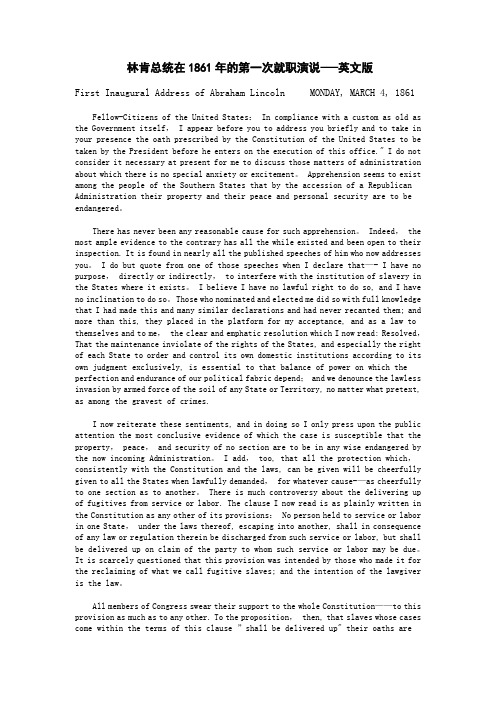
林肯总统在1861年的第一次就职演说-—英文版First Inaugural Address of Abraham Lincoln MONDAY, MARCH 4, 1861Fellow-Citizens of the United States: In compliance with a custom as old as the Government itself, I appear before you to address you briefly and to take in your presence the oath prescribed by the Constitution of the United States to be taken by the President before he enters on the execution of this office." I do not consider it necessary at present for me to discuss those matters of administration about which there is no special anxiety or excitement。
Apprehension seems to exist among the people of the Southern States that by the accession of a Republican Administration their property and their peace and personal security are to be endangered。
There has never been any reasonable cause for such apprehension。
Indeed, the most ample evidence to the contrary has all the while existed and been open to their inspection. It is found in nearly all the published speeches of him who now addresses you。
林肯演说词

林肯著名演讲Gettysburg Address 葛底斯堡演说Gettysburg, PennsylvaniaNovember 19, 1863-Fourscore and seven years ago our fathers brought forth upon this continent, a new nation, conceived in Liberty, and dedicated to the proposition that all men are created equal.-Now we are engaged in a great civil war, testing whether that nation, or any nation so conceived and so dedicated, can long endure. We are met on a great battle-field of that war. We have come to dedicate a portion of that field as a final resting place for those who here gave their lives. That nation might live. It is altogether fitting and proper that we should do this.-But, in a larger sense, we can not dedicate, we can not consecrate, we can not hallow this ground. The brave men, living and dead, who struggled here, have consecrated it, far above our poor power to add or detract. The world will little note, nor long remember what we say here, but it can never forget what they did here.-It is for us the living, rather, to be dedicated here to the unfinished work which they who fought here have thus far so nobly advanced. It is rather for us to be here dedicated to the great task remaining before us - that from these honored dead we take increased devotion to - that cause for which they gave the last full measure of devotion - that we here highly resolve - that these dead shall not have died in vain - that this nation, under God, shall have a new birth of freedom - and that government of the people, by the people, and for the people, shall not perish from the earth.(By Abraham Lincoln)葛底斯堡演说亚伯拉罕·林肯,1863年11月19日宾夕法尼亚葛底斯堡(盖兹堡)公墓山87年前,我们的先辈们在这个大陆上创立了一个新国家,它孕育于自由之中,奉行一切人生来平等的原则。
林肯第二次就职演说译文

林肯第二次就职演说译文篇一:林肯第二次就职演说的全文如下:同胞们,我在今天站在这里,向大家发表这篇演说,是因为我知道,我们的国家需要更多的英雄来领导我们。
我们的国家曾经历了无数的痛苦和磨难,但我们有足够的勇气和智慧来克服这些困难。
我们需要一个领袖,一个能够为我们的国家和人民利益而战斗的领袖。
我们的国家曾经被背叛和破坏,我们失去了我们的自由和尊严。
但现在,我们需要更多的英雄来重建我们的国家,让我们重新找回我们的自由和尊严。
我们需要一个领袖,一个能够领导我们走向自由和民主的领袖。
我们的国家需要更多的英雄来领导我们,因为我们的国家正在面临着各种挑战。
我们的社会和经济正在不断变化,我们需要一个领袖来适应这些变化,并为我们的国家提供新的希望和方向。
我们的国家需要更多的英雄来领导我们,因为我们的国家需要更多的英雄来保护我们的文化和传统。
我们的文化和传统是我们人民的文化遗产,我们需要一个领袖来保护和传承这些文化遗产,并让我们的国家更加多元化和包容。
同胞们,我是一个公民,我有责任为我的祖国服务。
我相信,如果我们团结一心,如果我们共同努力,我们一定能够创造更加美好的未来。
让我们携手前行,为了我们的梦想和我们的祖国。
谢谢大家。
篇二:林肯第二次就职演说的译文如下:尊敬的联邦人民:我林肯,今天站在这里,代表联邦人民发表这篇就职演说,感到非常荣幸。
在过去的一年中,我们经历了许多挑战和困难。
我们的国家面临着分裂和危险,我们的人民面临着无数的痛苦和苦难。
然而,我相信,我们有一个强大的国家和一个伟大的人民,我们能够克服这些挑战,重振我们的国家,让我们的人民过上更加美好的生活。
我们的国家在过去几十年中取得了巨大的进步。
我们的人民通过团结合作,克服了许多困难和挑战。
我们建立了一个强大的国家,一个能够为我们的所有人民提供安全和繁荣的国家。
但是,我们需要继续保持我们的团结和合作,以便我们能够在未来取得更大的成就。
我们需要继续团结一致,为我们的国家和我们的人民创造一个更加美好的世界。
林肯葛底斯堡演说中英文对照翻译
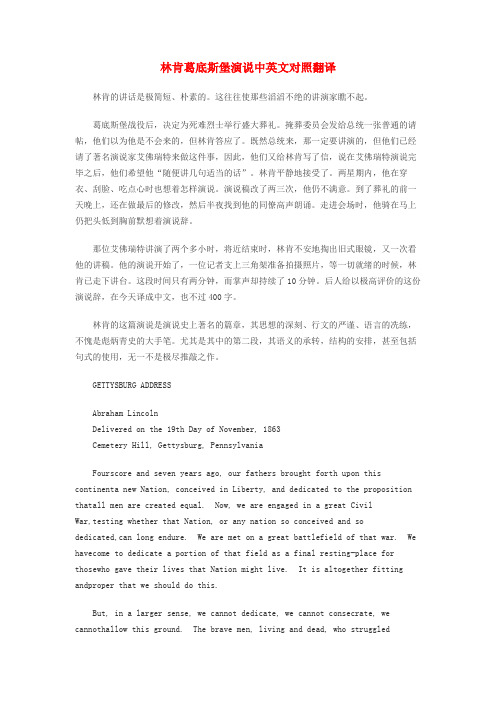
林肯葛底斯堡演说中英文对照翻译林肯的讲话是极简短、朴素的。
这往往使那些滔滔不绝的讲演家瞧不起。
葛底斯堡战役后,决定为死难烈士举行盛大葬礼。
掩葬委员会发给总统一张普通的请帖,他们以为他是不会来的,但林肯答应了。
既然总统来,那一定要讲演的,但他们已经请了著名演说家艾佛瑞特来做这件事,因此,他们又给林肯写了信,说在艾佛瑞特演说完毕之后,他们希望他“随便讲几句适当的话”。
林肯平静地接受了。
两星期内,他在穿衣、刮脸、吃点心时也想着怎样演说。
演说稿改了两三次,他仍不满意。
到了葬礼的前一天晚上,还在做最后的修改,然后半夜找到他的同僚高声朗诵。
走进会场时,他骑在马上仍把头低到胸前默想着演说辞。
那位艾佛瑞特讲演了两个多小时,将近结束时,林肯不安地掏出旧式眼镜,又一次看他的讲稿。
他的演说开始了,一位记者支上三角架准备拍摄照片,等一切就绪的时候,林肯已走下讲台。
这段时间只有两分钟,而掌声却持续了10分钟。
后人给以极高评价的这份演说辞,在今天译成中文,也不过400字。
林肯的这篇演说是演说史上著名的篇章,其思想的深刻、行文的严谨、语言的冼练,不愧是彪炳青史的大手笔。
尤其是其中的第二段,其语义的承转,结构的安排,甚至包括句式的使用,无一不是极尽推敲之作。
GETTYSBURG ADDRESSAbraham LincolnDelivered on the 19th Day of November, 1863Cemetery Hill, Gettysburg, PennsylvaniaFourscore and seven years ago, our fathers brought forth upon this continenta new Nation, conceived in Liberty, and dedicated to the proposition thatall men are created equal. Now, we are engaged in a great CivilWar,testing whether that Nation, or any nation so conceived and sodedicated,can long endure. We are met on a great battlefield of that war. We havecome to dedicate a portion of that field as a final resting-place for thosewho gave their lives that Nation might live. It is altogether fitting andproper that we should do this.But, in a larger sense, we cannot dedicate, we cannot consecrate, we cannothallow this ground. The brave men, living and dead, who struggledhere,have consecrated it far above our power to add or detract. The world willlittle note nor long remember what we say here, but it can never forget whatthey did here. It is for us, the living, rather to be dedicated to thegreat task remaining before us; that from these honored dead, we takeincreased devotion to that cause for which they gave the last full measureof devotion; that this Nation, under GOD, shall have a new birth of freedom;and that government of the People by the People and for the People shall notperish from the earth.葛底斯堡演说亚伯拉罕·林肯,1963年11月19日87年前,我们的先辈们在这个大陆上创立了一个新国家,它孕育于自由之中,奉行一切人生来平等的原则。
林肯第二次就职演讲(英文)

林肯第二次就职演讲(英文)第一篇:林肯第二次就职演讲(英文)At this second appearing to take the oath of the presidential office there is less occasion for an extended address than there was at the first.Then a statement somewhat in detail of a course to be pursued seemed fitting and proper.Now, at the expiration of four years, during which public declarations have been constantly called forth on every point and phase of his great contest which still absorbs the attention and engrosses the energies of the nation, little that is new could be presented.The progress of our arms, upon which all else chiefly depends, is as well known to the public as to myself, and it is, I trust, reasonably satisfactory and encouraging to all.With high hope for the future, no prediction in regardto it is ventured.On the occasion corresponding to this four years ago all thoughts were anxiously directed to an impending civil war.All dreaded it;all sought to avert it.While the inaugural address was being delivered from this place, devoted altogether to saving teing delivered from thisurgent agents were in the city seeking to destroy it without war-seeking to dissolve the Union and divide effects by negotiation.Both parties deprecated war, but one of them would make war rather than let the nation survive, and the other would accept war rather than let it perish, and the war came.One-eighth of the whole population were colored slaves, not distributed generally over the Union, but localized in the southern part of it.Their slaves constituted a peculiar and powerful interest.All knew that this interest was somehow the cause of the war.T o strengthen, perpetuate, and extend this interest was the object for which the insurgentswould rend the Union even by war, while the Government claimed no right to do more than to restrict the territorial enlargement of it.Neither party expected for the war the magnitude or the duration, which it has already attained.Neither anticipated that the cause of the conflict might cease with or even before the conflict itself should cease.Each looked for an easier triumph, and a result less fundamental and astounding.Both read the same Bible and pray to the same God, and each invokes His aid against the other.It may seem strange that any men should dare to ask a just God's assistance in wringing their bread from the sweat of other men's faces, but let us judge not, that we be not judged.That of neither has been answered fully.The Almighty has His own purposes.“Woe unto the world because of offenses;for it must need be that offenses come, but woe to that man by whom the offense comet.” If we shall suppose that American slavery is one of those offenses which, in the providence of God, must needs come, but which, having continued through His appointed time, He now wills to remove, and that He gives to both North and South this terrible war as the woe due to those by whom the offense came, shall we discern there in any departure from those divine attributes which the believers in a living God always ascribe to Him? Fondly do we hope, fervently do we pray that this mighty scourge of war may speedily passaway? Yet, if God wills that it continue until all the wealth piled by the bondsman's two hundred and fifty years of unrequited toil shall be sunk, and until every drop of blood drawn with the lash shall be paid by another drawn with the sword, as was said three thousand years ago so still it must be said “The judgments of the Lord are true and righteousaltogether.”With malice toward none, with charity for all, with firmness in the right as God gives us to see the might, let us strive on to finish the work we are in, to bind up the nation's wounds, to care for him who shall have borne the battle and for his widow and his orphan, to do all which may achieve and cherish a just and lasting peace among ourselves and with allnations.第二篇:林肯第二次就职演讲在我现在第二次来到这里宣誓就任总统职位的时候,就不十分必要像第一次就职时那样作长篇演说了。
林肯第二次就职演说译文

林肯第二次就职演说译文
林肯第二次就职演说原文如下:
尊敬的联邦公民们:
我谨代表美国人民,在此宣誓就职。
我相信,我们的国家需要一位更加伟大的领袖来引领我们前进。
正如我们在第一次就职演说中所说的那样,我们的国家正处于危急时刻。
我们需要有人能够承担起这个责任,为我们的国家和我们的人民谋福利。
我们的国家在过去几十年中经历了许多挑战和困难。
我们的人民受到了不公正待遇,受到了种族歧视和压迫。
这些问题我们必须克服,因为这些问题不仅影响我们个人的生活,而且不仅影响我们子孙后代的生活,而且不仅影响整个人类的未来。
我们需要采取积极的措施来解决这个问题。
我们必须继续推动平等、公正和自由,确保每个人都受到尊重和平等对待。
我们必须确保所有种族、所有民族和所有性别的人都能够在我们的社会中发挥他们应有的作用。
我们必须保护我们的文化和价值观,确保它们不会被摧毁或削弱。
但是,这些措施需要我们的共同努力。
我们需要团结一致,共同努力克服这些挑战。
我们需要发挥我们的创造力,共同努力创造更好的社会。
我们需要教育我们的下一代,让他们成为更好的领袖,带领我们走向更加美好的未来。
我相信,只要我们共同努力,我们的国家必将变得更加强大和繁荣。
只要我们团结一致,我们必将克服任何困难,实现我们的梦想。
我
期待着我们共同迈向更加美好的未来。
谢谢大家。
#097 - 译文Abraham Lincoln, Part 2
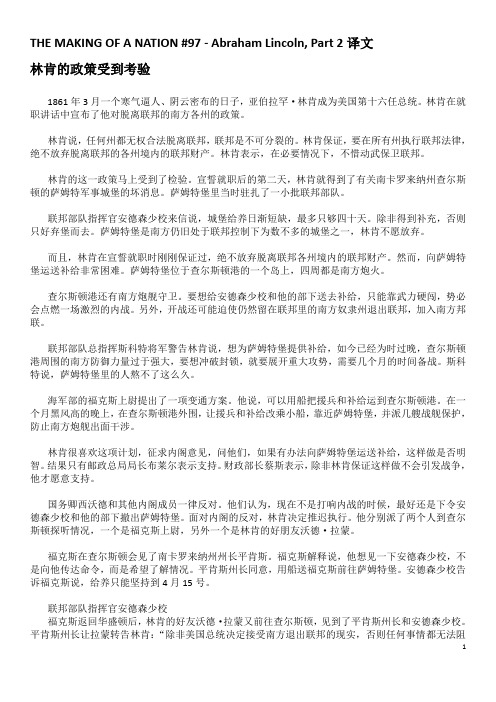
THE MAKING OF A NATION #97 - Abraham Lincoln, Part 2译文林肯的政策受到考验1861年3月一个寒气逼人、阴云密布的日子,亚伯拉罕·林肯成为美国第十六任总统。
林肯在就职讲话中宣布了他对脱离联邦的南方各州的政策。
林肯说,任何州都无权合法脱离联邦,联邦是不可分裂的。
林肯保证,要在所有州执行联邦法律,绝不放弃脱离联邦的各州境内的联邦财产。
林肯表示,在必要情况下,不惜动武保卫联邦。
林肯的这一政策马上受到了检验。
宣誓就职后的第二天,林肯就得到了有关南卡罗来纳州查尔斯顿的萨姆特军事城堡的坏消息。
萨姆特堡里当时驻扎了一小批联邦部队。
联邦部队指挥官安德森少校来信说,城堡给养日渐短缺,最多只够四十天。
除非得到补充,否则只好弃堡而去。
萨姆特堡是南方仍旧处于联邦控制下为数不多的城堡之一,林肯不愿放弃。
而且,林肯在宣誓就职时刚刚保证过,绝不放弃脱离联邦各州境内的联邦财产。
然而,向萨姆特堡运送补给非常困难。
萨姆特堡位于查尔斯顿港的一个岛上,四周都是南方炮火。
查尔斯顿港还有南方炮舰守卫。
要想给安德森少校和他的部下送去补给,只能靠武力硬闯,势必会点燃一场激烈的内战。
另外,开战还可能迫使仍然留在联邦里的南方奴隶州退出联邦,加入南方邦联。
联邦部队总指挥斯科特将军警告林肯说,想为萨姆特堡提供补给,如今已经为时过晚,查尔斯顿港周围的南方防御力量过于强大,要想冲破封锁,就要展开重大攻势,需要几个月的时间备战。
斯科特说,萨姆特堡里的人熬不了这么久。
海军部的福克斯上尉提出了一项变通方案。
他说,可以用船把援兵和补给运到查尔斯顿港。
在一个月黑风高的晚上,在查尔斯顿港外围,让援兵和补给改乘小船,靠近萨姆特堡,并派几艘战舰保护,防止南方炮舰出面干涉。
林肯很喜欢这项计划,征求内阁意见,问他们,如果有办法向萨姆特堡运送补给,这样做是否明智。
结果只有邮政总局局长布莱尔表示支持。
财政部长蔡斯表示,除非林肯保证这样做不会引发战争,他才愿意支持。
林肯就职演讲(英文)
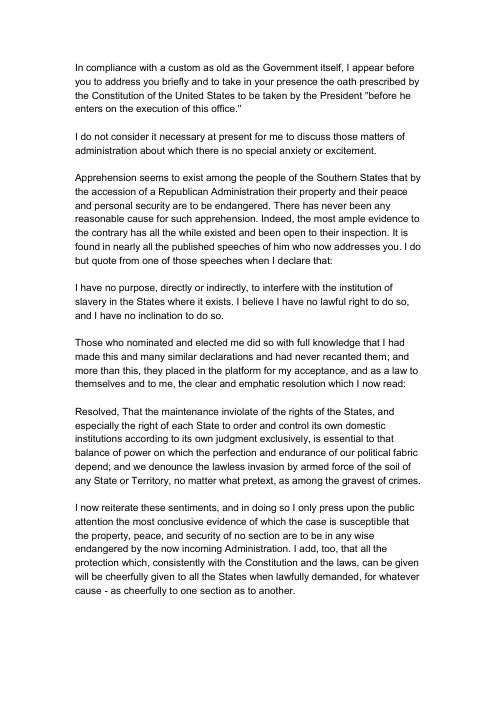
In compliance with a custom as old as the Government itself, I appear before you to address you briefly and to take in your presence the oath prescribed by the Constitution of the United States to be taken by the President "before he enters on the execution of this office."I do not consider it necessary at present for me to discuss those matters of administration about which there is no special anxiety or excitement.Apprehension seems to exist among the people of the Southern States that by the accession of a Republican Administration their property and their peace and personal security are to be endangered. There has never been any reasonable cause for such apprehension. Indeed, the most ample evidence to the contrary has all the while existed and been open to their inspection. It is found in nearly all the published speeches of him who now addresses you. I do but quote from one of those speeches when I declare that:I have no purpose, directly or indirectly, to interfere with the institution of slavery in the States where it exists. I believe I have no lawful right to do so, and I have no inclination to do so.Those who nominated and elected me did so with full knowledge that I had made this and many similar declarations and had never recanted them; and more than this, they placed in the platform for my acceptance, and as a law to themselves and to me, the clear and emphatic resolution which I now read:Resolved, That the maintenance inviolate of the rights of the States, and especially the right of each State to order and control its own domestic institutions according to its own judgment exclusively, is essential to that balance of power on which the perfection and endurance of our political fabric depend; and we denounce the lawless invasion by armed force of the soil of any State or Territory, no matter what pretext, as among the gravest of crimes.I now reiterate these sentiments, and in doing so I only press upon the public attention the most conclusive evidence of which the case is susceptible that the property, peace, and security of no section are to be in any wise endangered by the now incoming Administration. I add, too, that all the protection which, consistently with the Constitution and the laws, can be given will be cheerfully given to all the States when lawfully demanded, for whatever cause - as cheerfully to one section as to another.There is much controversy about the delivering up of fugitives from service or labour. The clause I now read is as plainly written in the Constitution as any other of its provisions:No person held to service or labour in one State, under the laws thereof, escaping into another, shall in consequence of any law or regulation therein be discharged from such service or labour, but shall be delivered up on claim of the party to whom such service or labour may be due.It is scarcely questioned that this provision was intended by those who made it for the reclaiming of what we call fugitive slaves; and the intention of the lawgiver is the law. All members of Congress swear their support to the whole Constitution - to this provision as much as to any other. To the proposition, then, that slaves whose cases come within the terms of this clause "shall be delivered up" their oaths are unanimous. Now, if they would make the effort in good temper, could they not with nearly equal unanimity frame and pass a law by means of which to keep good that unanimous oath?There is some difference of opinion whether this clause should be enforced by national or by State authority, but surely that difference is not a very material one. If the slave is to be surrendered, it can be of but little consequence to him or to others by which authority it is done. And should anyone in any case be content that his oath shall go un-kept on a merely unsubstantial controversy as to how it shall be kept?Again: In any law upon this subject ought not all the safeguards of liberty known in civilized and humane jurisprudence to be introduced, so that a free man be not in any case surrendered as a slave? And might it not be well at the same time to provide by law for the enforcement of that clause in the Constitution which guarantees that "the citizens of each State shall be entitled to all privileges and immunities of citizens in the several States"?I take the official oath to-day with no mental reservations and with no purpose to construe the Constitution or laws by any hypercritical rules; and while I do not choose now to specify particular acts of Congress as proper to be enforced, I do suggest that it will be much safer for all, both in official and private stations, to conform to and abide by all those acts which stand un-repealed than to violate any of them trusting to find impunity in having them held to be unconstitutional.It is seventy-two years since the first inauguration of a President under our National Constitution. During that period fifteen different and greatlydistinguished citizens have in succession administered the executive branch of the Government. They have conducted it through many perils, and generally with great success. Yet, with all this scope of precedent, I now enter upon the same task for the brief constitutional term of four years under great and peculiar difficulty. A disruption of the Federal Union, heretofore only menaced, is now formidably attempted.TopI hold that in contemplation of universal law and of the Constitution the Union of these States is perpetual. Perpetuity is implied, if not expressed, in the fundamental law of all national governments. It is safe to assert that no government proper ever had a provision in its organic law for its own termination. Continue to execute all the express provisions of our National Constitution, and the Union will endure forever, it being impossible to destroy it except by some action not provided for in the instrument itself.Again: If the United States be not a government proper, but an association of States in the nature of contract merely, can it, as a contract, be peaceably unmade by less than all the parties who made it? One party to a contract may violate it - break it, so to speak - but does it not require all to lawfully rescind it?Descending from these general principles, we find the proposition that in legal contemplation the Union is perpetual confirmed by the history of the Union itself. The Union is much older than the Constitution. It was formed, in fact, by the Articles of Association in 1774. It was matured and continued by the Declaration of Independence in 1776. It was further matured, and the faith of all the then thirteen States expressly plighted and engaged that it should be perpetual, by the Articles of Confederation in 1778. And finally, in 1787, one of the declared objects for ordaining and establishing the Constitution was "to form a more perfect Union."But if destruction of the Union by one or by a part only of the States be lawfully possible, the Union is less perfect than before the Constitution, having lost the vital element of perpetuity.It follows from these views that no State upon its own mere motion can lawfully get out of the Union; that resolves and ordinances to that effect are legally void, and that acts of violence within any State or States against the authority of the United States are insurrectionary or revolutionary, according to circumstances.I therefore consider that in view of the Constitution and the laws the Union is unbroken, and to the extent of my ability, I shall take care, as the Constitutionitself expressly enjoins upon me, that the laws of the Union be faithfully executed in all the States. Doing this I deem to be only a simple duty on my part, and I shall perform it so far as practicable unless my rightful masters, the American people, shall withhold the requisite means or in some authoritative manner direct the contrary. I trust this will not be regarded as a menace, but only as the declared purpose of the Union that it will constitutionally defend and maintain itself.In doing this there needs to be no bloodshed or violence, and there shall be none unless it be forced upon the national authority. The power confided to me will be used to hold, occupy, and possess the property and places belonging to the Government and to collect the duties and imposts; but beyond what may be necessary for these objects, there will be no invasion, no using of force against or among the people anywhere. Where hostility to the United States in any interior locality shall be so great and universal as to prevent competent resident citizens from holding the Federal offices, there will be no attempt to force obnoxious strangers among the people for that object. While the strict legal right may exist in the Government to enforce the exercise of these offices, the attempt to do so would be so irritating and so nearly impracticable withal that I deem it better to forego for the time the uses of such offices.TopThe mails, unless repelled, will continue to be furnished in all parts of the Union. So far as possible the people everywhere shall have that sense of perfect security which is most favourable to calm thought and reflection. The course here indicated will be followed unless current events and experience shall show a modification or change to be proper, and in every case and exigency my best discretion will be exercised, according to circumstances actually existing and with a view and a hope of a peaceful solution of the national troubles and the restoration of fraternal sympathies and affections.That there are persons in one section or another who seek to destroy the Union at all events and are glad of any pretext to do it I will neither affirm nor deny; but if there be such, I need address no word to them. To those, however, who really love the Union may I not speak?Before entering upon so grave a matter as the destruction of our national fabric, with all its benefits, its memories, and its hopes, would it not be wise to ascertain precisely why we do it? Will you hazard so desperate a step while there is any possibility that any portion of the ills you fly from have no real existence? Will you, while the certain ills you fly to are greater than all the real ones you fly from, will you risk the commission of so fearful a mistake?All profess to be content in the Union if all constitutional rights can be maintained. Is it true, then, that any right plainly written in the Constitution has been denied? I think not. Happily, the human mind is so constituted that no party can reach to the audacity of doing this. Think, if you can, of a single instance in which a plainly written provision of the Constitution has ever been denied. If by the mere force of numbers a majority should deprive a minority of any clearly written constitutional right, it might in a moral point of view justify revolution; certainly would if such right were a vital one. But such is not our case. All the vital rights of minorities and of individuals are so plainly assured to them by affirmations and negations, guaranties and prohibitions, in the Constitution that controversies never arise concerning them. But no organic law can ever be framed with a provision specifically applicable to every question which may occur in practical administration. No foresight can anticipate nor any document of reasonable length contain express provisions for all possible questions. Shall fugitives from labor be surrendered by national or by State authority? The Constitution does not expressly say. May Congress prohibit slavery in the Territories? The Constitution does not expressly say. Must Congress protect slavery in the Territories? The Constitution does not expressly say.。
GettysburgAddress林肯葛底斯堡演说中英对译版
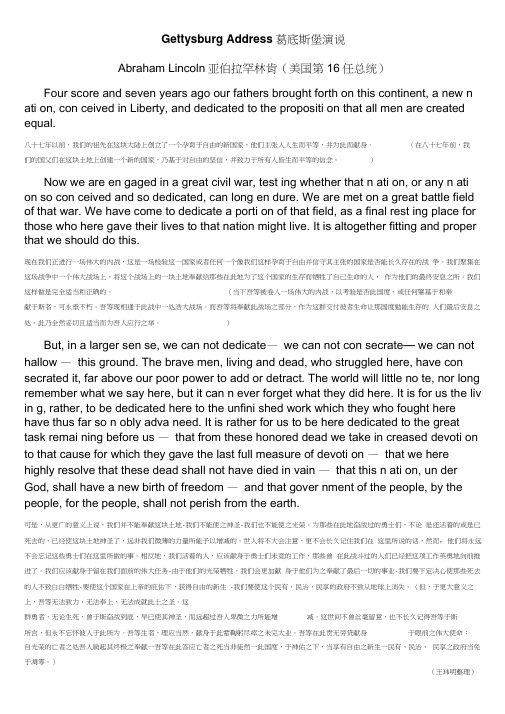
Gettysburg Address葛底斯堡演说Abraham Lincoln亚伯拉罕林肯(美国第16任总统)Four score and seven years ago our fathers brought forth on this continent, a new n ati on, con ceived in Liberty, and dedicated to the propositi on that all men are created equal.八十七年以前,我们的祖先在这块大陆上创立了一个孕育于自由的新国家,他们主张人人生而平等,并为此而献身。
(在八十七年前,我们的国父们在这块土地上创建一个新的国家,乃基于对自由的坚信,并致力于所有人皆生而平等的信念。
)Now we are en gaged in a great civil war, test ing whether that n ati on, or any n ati on so con ceived and so dedicated, can long en dure. We are met on a great battle field of that war. We have come to dedicate a porti on of that field, as a final rest ing place for those who here gave their lives to that nation might live. It is altogether fitting and proper that we should do this.现在我们正进行一场伟大的内战,这是一场检验这一国家或者任何一个像我们这样孕育于自由并信守其主张的国家是否能长久存在的战争。
我们聚集在这场战争中一个伟大战场上,将这个战场上的一块土地奉献给那些在此地为了这个国家的生存而牺牲了自己生命的人,作为他们的最终安息之所。
林肯就职演讲稿中英版

林肯就职演讲稿中英版主讲:亚伯拉罕·林肯时间:1863年11月19日地点:美国,宾夕法尼亚,葛底斯堡八十七年前,我们先辈在这个大陆上创立了一个新国家,它孕育于自由之中,奉行一切人生来平等的原则。
我们正从事一场伟大的内战,以考验这个国家,或者任何一个孕育于自由和奉行上述原则的国家是否能够长久存在下去。
我们在这场战争中的一个伟大战场上集会。
烈士们为使这个国家能够生存下去而献出了自己的生命,我们来到这里,是要把这个战场的一部分奉献给他们作为最后安息之所。
我们这样做是完全应该而且非常恰当的。
但是,从更广泛的意义上说,这块土地我们不能够奉献,不能够圣化,不能够神化。
那些曾在这里战斗过的勇士们,活着的和去世的,已经把这块土地圣化了,这远不是我们微薄的力量所能增减的。
我们今天在这里所说的话,全世界不大会注意,也不会长久地记住,但勇士们在这里所做过的事,全世界却永远不会忘记。
毋宁说,倒是我们这些还活着的人,应该在这里把自己奉献于勇士们已经如此崇高地向前推进但尚未完成的事业。
倒是我们应该在这里把自已奉献于仍然留在我们面前的伟大任务——我们要从这些光荣的死者身上吸取更多的献身精神,来完成他们已经完全彻底为之献身的事业;我们要在这里下定最大的决心,不让这些死者白白牺牲;我们要使国家在上帝福佑下自由的新生,要使这个民有、民治、民享的政府永世长存。
Gettysburg, PennsylvaniaNovember 19, 1863Fourscore and seven years ago,our fathers brought forth upon this continent a new nation,conceived and dedicated to the proposition that all men are created equal.Now we are egaged in a great civil war,testing whether that nation or any nation so conceived and dedicated can long are met on the battelfield of that have come to dedicate a portion of that field as a final-resting place for those who gave their lives that the nation might is altogether and proper that we should do this.But, in a larger sense,we can not dedicate,we can not consecrate,we can not hallow this bravemen,living and dead,have consecrated it far above our power to add or world will little note what we say here,but it can never forget what they did is for us,the living,rather to be dedicated to the great task remaining before us,that from these honored dead we take increased devotion to that cause for which they gave the last full measure of devotion,that the nation shall have a new birth of freedom,that the goverment of the people by the people and for the people shall not perish from the earth.。
林肯的葛底斯堡演说(中英文)
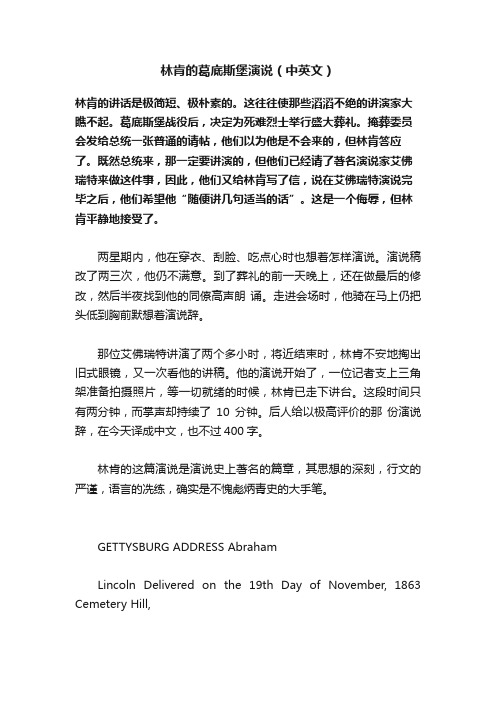
林肯的葛底斯堡演说(中英文)林肯的讲话是极简短、极朴素的。
这往往使那些滔滔不绝的讲演家大瞧不起。
葛底斯堡战役后,决定为死难烈士举行盛大葬礼。
掩葬委员会发给总统一张普通的请帖,他们以为他是不会来的,但林肯答应了。
既然总统来,那一定要讲演的,但他们已经请了著名演说家艾佛瑞特来做这件事,因此,他们又给林肯写了信,说在艾佛瑞特演说完毕之后,他们希望他“随便讲几句适当的话”。
这是一个侮辱,但林肯平静地接受了。
两星期内,他在穿衣、刮脸、吃点心时也想着怎样演说。
演说稿改了两三次,他仍不满意。
到了葬礼的前一天晚上,还在做最后的修改,然后半夜找到他的同僚高声朗诵。
走进会场时,他骑在马上仍把头低到胸前默想着演说辞。
那位艾佛瑞特讲演了两个多小时,将近结束时,林肯不安地掏出旧式眼镜,又一次看他的讲稿。
他的演说开始了,一位记者支上三角架准备拍摄照片,等一切就绪的时候,林肯已走下讲台。
这段时间只有两分钟,而掌声却持续了10分钟。
后人给以极高评价的那份演说辞,在今天译成中文,也不过400字。
林肯的这篇演说是演说史上著名的篇章,其思想的深刻,行文的严谨,语言的冼练,确实是不愧彪炳青史的大手笔。
GETTYSBURG ADDRESS AbrahamLincoln Delivered on the 19th Day of November, 1863 Cemetery Hill,Gettysburg, PennsylvaniaFour score and seven years ago our fathers brought forth on this continent, a new nation, conceived in Liberty, and dedicated to the proposition that all men are created equal.Now we are engaged in a great civil war, testing whether that nation, or any nation so conceived and so dedicated, can long endure. We are met on a great battle-field of that war. We have come to dedicate a portion of that field, as a final resting place for those who here gave their lives that that nation might live. It is altogether fitting and proper that we should do this.But, in a larger sense, we can not dedicate -- we can not consecrate -- we can not hallow -- this ground. The brave men, living and dead, who struggled here, have consecrated it, far above our poor power to add or detract. The world will little note, nor long remember what we say here, but it can never forget what they did here. It is for us the living, rather, to be dedicated here to the unfinished work which they who fought here have thus far so nobly advanced. It is rather for us to be here dedicated to the great task remaining before us -- that from these honored dead we take increased devotion to that cause for which they gave the last full measure of devotion -- that we here highly resolve that these dead shall not have died in vain -- that this nation, under God, shall have a new birth of freedom -- and that government of the people, by the people, for the people, shall not perish from the earth.葛底斯堡演说亚伯拉罕·林肯,1963年11月19日87年前,我们的先辈们在这个大陆上创立了一个新国家,它孕育于自由之中,奉行一切人生来平等的原则。
GettysburgAddress林肯演讲原文中译
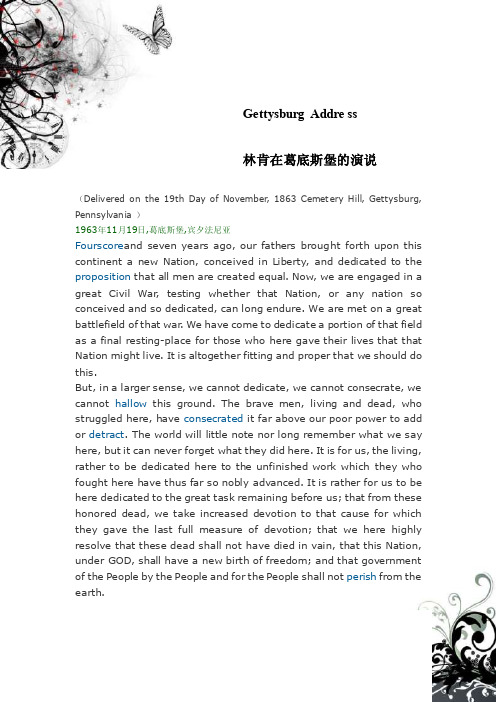
Gettys burgAddres s林肯在葛底斯堡的演说(Delive red on the 19th Day of Novemb er, 1863 Cemete ry Hill, Gettys burg, Pennsy lvani a )1963年11月19日,葛底斯堡,宾夕法尼亚Foursc ore and sevenyearsago, our father s brough t forthupon this contin ent a new Nation, concei ved in Libert y, and dedica ted to the propos ition that all men are create d equal. Now, we are engage d in a greatCivilWar, testin g whethe r that Nation, or any nation so concei ved and so dedica ted, can long endure. We are met on a greatbattle field of that war. We have come to dedica te a portio n of that fieldas a finalrestin g-placefor thosewho here gave theirlivesthat that Nation mightlive. It is altoge therfittin g and proper that we should do this.But, in a larger sense, we cannot dedica te, we cannot consec rate, we cannot hallow this ground. The bravemen, living and dead, who strugg led here, have consec rated it far aboveour poor powerto add or detrac t. The worldwill little note nor long rememb er what we say here, but it can neverforget what they did here. It is for us, the living, rather to be dedica ted here to the unfini shedwork whichthey who fought here have thus far so noblyadvanc ed. It is rather for us to be here dedica ted to the greattask remain ing before us; that from thesehonore d dead, we take increa sed devoti on to that causefor whichthey gave the last full measur e of devoti on; that we here highly resolv e that thesedead shallnot have died in vain, that this Nation, underGOD, shallhave a new birthof freedo m; and that govern mentof the People by the People and for the People shallnot perish from the earth.87年前,我们的先辈们在这个大陆上创立了一个新国家,它孕育于自由之中,奉行一切人生来平等的原则。
林肯3分钟演讲稿中英文版
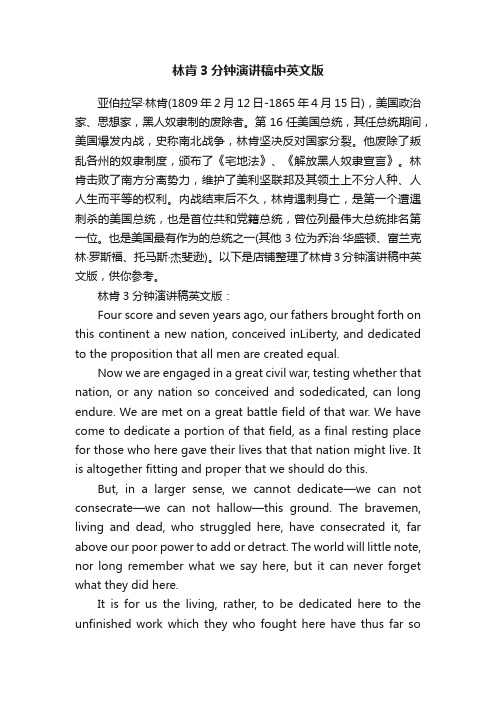
林肯3分钟演讲稿中英文版亚伯拉罕·林肯(1809年2月12日-1865年4月15日),美国政治家、思想家,黑人奴隶制的废除者。
第16任美国总统,其任总统期间,美国爆发内战,史称南北战争,林肯坚决反对国家分裂。
他废除了叛乱各州的奴隶制度,颁布了《宅地法》、《解放黑人奴隶宣言》。
林肯击败了南方分离势力,维护了美利坚联邦及其领土上不分人种、人人生而平等的权利。
内战结束后不久,林肯遇刺身亡,是第一个遭遇刺杀的美国总统,也是首位共和党籍总统,曾位列最伟大总统排名第一位。
也是美国最有作为的总统之一(其他3位为乔治·华盛顿、富兰克林·罗斯福、托马斯·杰斐逊)。
以下是店铺整理了林肯3分钟演讲稿中英文版,供你参考。
林肯3分钟演讲稿英文版:Four score and seven years ago, our fathers brought forth on this continent a new nation, conceived inLiberty, and dedicated to the proposition that all men are created equal.Now we are engaged in a great civil war, testing whether that nation, or any nation so conceived and sodedicated, can long endure. We are met on a great battle field of that war. We have come to dedicate a portion of that field, as a final resting place for those who here gave their lives that that nation might live. It is altogether fitting and proper that we should do this.But, in a larger sense, we cannot dedicate—we can not consecrate—we can not hallow—this ground. The bravemen, living and dead, who struggled here, have consecrated it, far above our poor power to add or detract. The world will little note, nor long remember what we say here, but it can never forget what they did here.It is for us the living, rather, to be dedicated here to the unfinished work which they who fought here have thus far sonobly advanced. It is rather for us to be here dedicated to the great task remaining before us — that from these honored dead we take increased devotion to that cause for which they gave the last full measure of devotion — that we here highly resolve that these dead shall not have died in vain — that this nation, under God, shall have a new birth of freedom — and that government of the people, by the people, for the people, shall not perish from the earth.林肯3分钟演讲稿中文版:八十七年前吾辈先祖于这大陆上,创建一个新的国度,乃孕育于自由,且致力于凡人“皆生而平等”此信念。
【名人演讲】亚伯拉罕·林肯:在白宫的第一次总统就职演说

【名人演讲】亚伯拉罕·林肯:在白宫的第一次总统就职演说在白宫的第一次总统就职演说(美国)亚伯拉罕·林肯合众国的公民们:遵从和政府本身一样古老的惯例,我在你们面前做一次简明扼要的演讲,并当场立下誓言,这是美国宪法所规定的在总统“行使职责之前”所要履行的仪式。
我觉得没有必要探讨行政公务,目前没有特别忧虑或高兴的事情。
南部诸州的人民看起来存在着疑虑:共和党执政意味着他们的财产、和平和人身安全将会出现危险。
这种疑虑绝无明智的理由。
真的,事实是最有力的证据,供大家去检视。
你们可以从他几乎所有的演讲中发现这一点——就是现在在你们面前演讲的这人。
我只能从这些演讲中挑选一篇,当时我发表宣言——我并不企图,直接地或间接地去干涉蓄奴州的惯例。
我相信我没有这样做的合法权力,我也不倾向这样去做。
提名和选举我的这些人完全清楚,我已做了这个声明和许多类似声明,而且决不改变;不仅如此,在政纲宣言中,我接纳选举人的一项清晰明确的决议,这对他们、对我都是一个法律,我现在宣读一遍:决议:保持各州的权利不被亵渎,特别是各州依靠自己的独立判断去命令和管理自身机构的权利,这种权力平衡是必要的,能保证我们的政体尽善尽美和持久长远;我们公开抨击,用非法武力去侵犯各州或准州的土地的行为,不论用何种托词,都是最大的恶行。
我现在重申这些主张,只是向公众表明一个最鲜明的事实,没有哪个地区的财产、和平和安全会受到即将上任的政府的蓄意侵犯。
我还要加上一句,不论出于何种理由,只要各州的要求合法,政府都会高兴地给予与宪法和法律一致的保护——对各州不会厚此薄彼。
对于遣返逃避服兵役和服劳役者这个问题有很多分歧。
现在我宣布一个条款,这个条款和任何其他条款一样都是标明在宪法里:任何据一州之法律在该州中服役或服劳役之人逃往另一州,不能根据另一州任何法律或条例判决,而解除其服役或服劳役,而应依照有权要求该项服役或服劳役之当事一方的要求,把该人遣送。
- 1、下载文档前请自行甄别文档内容的完整性,平台不提供额外的编辑、内容补充、找答案等附加服务。
- 2、"仅部分预览"的文档,不可在线预览部分如存在完整性等问题,可反馈申请退款(可完整预览的文档不适用该条件!)。
- 3、如文档侵犯您的权益,请联系客服反馈,我们会尽快为您处理(人工客服工作时间:9:00-18:30)。
亚伯拉罕·林肯(Abraham Lincoln)就职演说
同胞们:
在第二次宣誓就职总统的时候,我不必像第一次那样作长篇的演讲了。
第一次就职典礼上,较为详尽地叙述我们要采取的方针和道路,看来是合适与恰当的。
现在,在我的四年任期结束之时,有关这场至今仍为举国瞩目与致力的大斗争的每个方面,时时有公开的宣告,因此没有新的内容向各位奉告了。
我们的一切都依靠武装力量,这方面的进展,大家知道得和我一样清楚。
我相信,大家对此颇感满意和鼓舞。
我们对未来抱有很大希望,在军事方面就无庸多作预测。
四年前我初次就职之际,全国思虑都集中在即将爆发的内战之上。
大家对内战都怀有恐惧,都设法避免这场内战的发生。
当时我在这个讲坛上发表的就职演说,全部内容就是为了不战而拯救联邦。
当时城里的叛逆分子却企图不用战争而摧毁联邦,企图通过谈判来瓦解联邦,瓜分国家所有。
双方都对战争,但其中一方却宁愿战争也不愿联邦毁灭,于是内战爆发。
我国黑奴占人口八分之一,他们不是普遍分布于全国各地,而是集中在南部。
这些黑奴,构成一种特殊而重要的利益。
尽人皆知,这种利益迟早会成为战争的起因。
叛逆分子不惜发动战争分裂联邦,以达到增大、扩展这种利益、使之永存的目的,政府却除去要求将奴隶制限于原来区域,不使扩大之外,不要求其他任何权利,双方都不曾预料到战争会有这样大的规模,持续这样久,不曾预料到引起冲突的原因在冲突停止前会消失。
双方都寻求轻而易举的胜利,不求彻底或惊人的结果。
双方信奉同一宗教。
敬拜同一上帝,都诉求上帝帮助战胜对方。
说来奇怪,竟有人敢于要求公正的上帝帮助自己去榨取别人的血汗;但我们不要去品评他人吧,以免受到别人的评论。
双方的祈求都不应得到满足,也没有任何一方得到完全的满足,因为全能的上帝自有主张。
“祸哉斯世,以其陷入故也,夫陷人于罪,事所必有,但陷人祸矣。
”如果我们把美国的奴隶制当成是上帝必定要降给我们的灾祸,这灾祸已经到了上帝指定期限,他现在要免去这场灾祸了。
他把这场可怕的战争降给南北双方,是要惩罚那些带来灾祸的人。
笃信耶稣基督的人常把许多美德归于基督,我们难道可以说基督的这些作为,与他的美德相悖吗?我们满怀希望,我们热诚祈祷,愿这场惩罚我们的战争早日过去;但假若天意
要这场战争延续下去,直至二百五十年来利用奴隶无偿劳动辛苦积聚下来的财富销毁净尽,直至奴隶在皮鞭下流淌的鲜血用刀剑下的鲜血来偿清,如同三千年前古语所说的那样,我们仍然要称颂上帝的判决是公允合理的。
我们对任何人不怀恶意,对所有人都抱有善心,对上帝使我们认识到的正义无限坚定。
让我们努力完成我们正在进行的工作,愈合国家的战争伤痕,关怀战死的烈士及其遗属,尽一切力量争得并维护我国及全世界的正义的、持久的和平。
